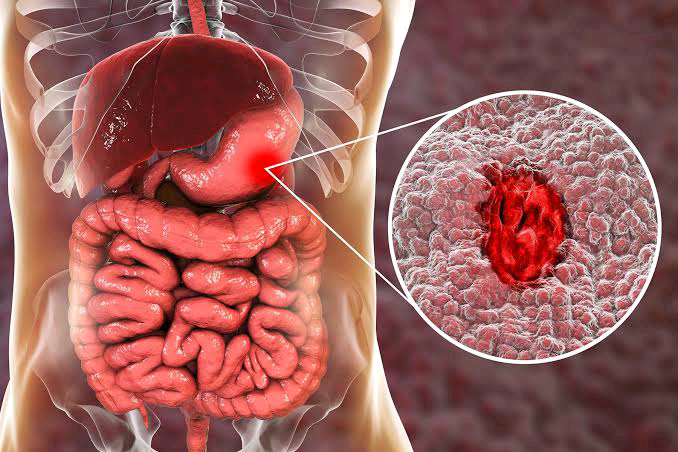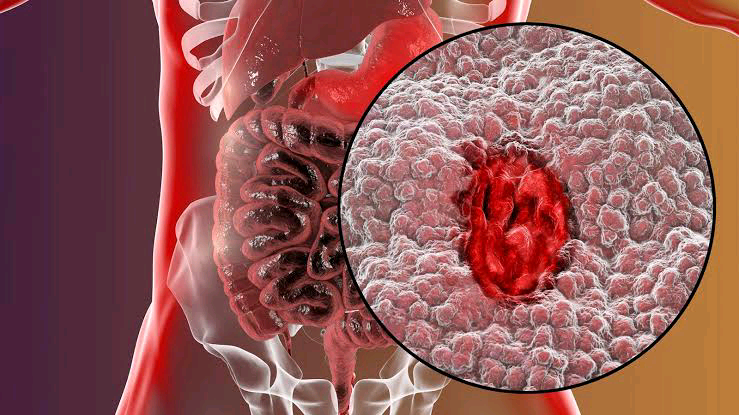Most people think an ulcer is just a sickness of the stomach and is caused by not eating well. Are you in this category? if yes, then you are wrong.
An ulcer is a painful sore that is slow to heal and sometimes recurs. Ulcers aren’t uncommon. How they appear and corresponding symptoms depend on what caused them and where they occur in your body.

Ulcers can appear anywhere in or on your body, from the lining in your stomach to the outer layer of your skin. Some cases of ulcers disappear on their own, but others require medical treatment to prevent serious complications.
There are different types of ulcers and the most common type is the peptic ulcer. Other types of ulcers include arterial ulcer, venous ulcer, mouth ulcer and genital ulcer. Talking about the most common type of ulcer which is the peptic ulcer, are sores or wounds that develop on the inside lining of your stomach, the upper portion of your small intestine, or your oesophagus. They form when digestive juices damage the walls of your stomach or intestine.
There are three types of peptic ulcers: Gastric ulcers, or ulcers that develop in the stomach liningesophageal ulcers, or ulcers that develop in the esophagusduodenal ulcers, or ulcers that develop in the duodenum (small intestine)Dwelling on the gastric ulcer which is also referred to as stomach ulcer, are painful sores in the stomach lining.
Stomach ulcers occur when the thick layer of mucus that protects your stomach from digestive juices is reduced. This allows the digestive acids to eat away at the tissues that line the stomach, causing an ulcer. Stomach ulcers may be easily cured, but they can become severe without proper treatment. Stomach ulcers are always caused by one of the following:
An infection with the bacterium Helicobacter pylori (H. pylori)long-term use of nonsteroidal anti-inflammatory drugs (NSAIDs), such as aspirin, ibuprofen, or naproxenRarely, a condition known as Zollinger-Ellison syndrome can cause stomach and intestinal ulcers by increasing the body’s production of acid. This syndrome is suspected to cause less than 1 per cent of all peptic ulcers. Understanding the signs of stomach ulcers is important in helping you get the treatment you need.
The most common symptom of a peptic ulcer is burning abdominal pain that extends from the navel to the chest, which can range from mild to severe. In some cases, the pain may wake you up at night. Small peptic ulcers may not produce any symptoms in the early phases.
Other common signs of a peptic ulcer include: changes in appetite nausea bloody or dark stools unexplained weight loss indigestion vomiting chest pain complications Left untreated, peptic ulcers can result in Internal bleeding.
Bleeding can occur as slow blood loss that leads to anaemia or as severe blood loss that may require hospitalization or a blood transfusion. Severe blood loss may cause black or bloody vomit or black or bloody stools.
A hole (perforation) in your stomach wall. Peptic ulcers can eat a hole through (perforate) the wall of your stomach or small intestine, putting you at risk of serious infection of your abdominal cavity (peritonitis).Obstruction.
Peptic ulcers can block the passage of food through the digestive tract, causing you to become full easily, to vomit and to lose weight either through swelling from inflammation or through scarring. Gastric cancer.
Studies have shown that people infected with H. pylori have an increased risk of gastric cancer. Other types of ulcers are explained below Arterial. (ischemic) ulcers are open sores that primarily develop on the outer side of your ankle, feet, toes, and heels. Arterial ulcers develop from damage to the arteries due to a lack of blood flow to the tissue.
These forms of ulcers can take months to heal and require proper treatment to prevent infection and further complications. Arterial ulcers have a “punched out” appearance accompanied with several symptoms, including red, yellow, or black soreshairless skin leg painno bleeding affected area cool to the touch from minimal blood circulation Treatment for arterial ulcers depends on the underlying cause.
Primary treatment includes restoring blood circulation to the affected area. While antibiotics may help reduce symptoms, your doctor may recommend surgery to increase blood flow to your tissues and organs. In more severe circumstances, your doctor may recommend amputation.
Venous ulcers — the most common type of leg ulcers — are open wounds often forming on your leg, below your knee and on the inner area of your ankle. They typically develop from damage to your veins caused by insufficient blood flow back to your heart. In some cases, venous ulcers cause little to no pain unless they’re infected. Other causes of this condition can be very painful.
Other symptoms you may experience include: inflammation swelling itchy skin stabbing discharge Venous ulcers can take months to fully heal.
In rare cases, they may never heal. Treatment focuses on improving flow to the affected area. Antibiotics can help prevent infection and reduce symptoms, but they aren’t enough to heal venous ulcers.
Alongside medication, your doctor may recommend surgery or compression therapy to increase blood flow. Mouth ulcers are small sores or lesions that develop in your mouth or the base of your gums. They’re commonly known as canker sores. These ulcers are triggered by several causes, including: biting the inside of your cheek food allergies hard teeth rushing hormonal changes vitamin deficiencies bacterial infection diseases Mouth ulcers are common and often go away within two weeks.
They can be uncomfortable but shouldn’t cause significant pain. If a mouth ulcer is extremely painful or doesn’t go away within two weeks, seek immediate medical attention. Minor mouth ulcers appear as small, round ulcers that leave no scarring. In more severe cases, they can develop into larger and deeper wounds.

Mouth ulcers often go away on their own without treatment. If they become painful, your doctor or dentist may prescribe an antimicrobial mouthwash or ointment to reduce your discomfort.
If your condition is the result of a more serious infection, seek medical attention to receive the best treatment. Genital ulcers are sores that develop on genital areas, including the penis, vagina, anus or surrounding areas.
They are usually caused by sexually transmitted infections (STIs), but genital ulcers can also be triggered by trauma, inflammatory diseases, or allergic reactions to skincare products.
In addition to sores, symptoms that may accompany genital ulcers include rash or bumps in the affected area pain or itching swollen glands in the groin area fever Similar to types of ulcers, treatment depends on the underlying cause of your condition.
In some cases, these sores will go away on their own. If diagnosed with an STI, your doctor may prescribe antiviral or antibiotic medication or ointment. If you feel you’ve been exposed to an STI, seek immediate medical attention. I hope we have come to understand what ulcer is really about and I guess most people didn’t know there were different types of ulcer aside from the popular type which is peptic ulcer.
Do you find Six9ja useful? Click here to give us five stars rating!











